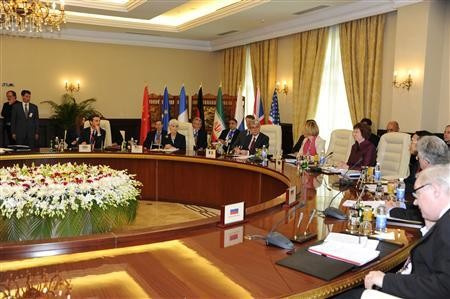What is the Economy's Role in the Iran-P5+1 Negotiations?
The world's economy needs tensions with Iran to be relieved

Amir Hossein Tavakkoli: It is clear that current negotiations have had a positive effect on different markets, including financial and monetary markets. What was previously seen in the form of different political, economic, and military threats in the tone and remarks of politicians has now been transformed into a constructive dialogue, which, without a doubt, positively influences business in Iran and around the world. The improvement of business and trade conditions will then lead to the prosperity of financial and monetary markets, which is what has also already happened. The negotiation process in Baghdad also helped to accelerate and improve this trend.
ID: What economic factors does the West consider in its decisions regarding Iran's nuclear dossier?
AHT: Different economic factors can be considered by the West in negotiations. But the most important of all is oil. And the issue of oil is not only about Iran's oil, but also Iran's strategic situation in the region and especially its extensive shoreline on the Persian Gulf, which is host to the daily transfer of a majority of the world's oil, and this makes Iran's role even more important in this issue. We must also not neglect Iran's important role in providing the energy needed for the world's industry. Some producer countries might be able to replace a part of Iran's energy production, but it is not economically viable to try to completely replace Iran's energy production, especially with reasonable costs and in a short amount of time.
ID: Does the world's economic situation have relatively sufficient stability to withstand the waves caused by Iran's nuclear dossier?
AHT: The world's economic situation is not an issue we can discuss in a simplistic manner. The question of how the world's economic situation can be defined and what factors influence it can be pondered. However, considering Europe's current economic problems that have led to serious political changes in countries such as France and, prior to that, Italy; and taking into consideration the current crisis in the Euro zone, we can say that the economic situation in Europe is not a favorable one. The spread of unemployment in Europe, especially among the younger generation, has led to, and will continue to lead to, serious political, social, and economic problems. The situation in the United States is better and the US economy has greater stability than Europe. Statistics regarding the US economy show that a more stable economic growth can been observed in this country. The Chinese economy has shown positive signs as well, but some economic observers are said to have observed signs of recession in the Chinese economy. Regarding the Russian economy, we can say that it does not have enough influence on the international economic scene so as to be able to affect the world's economic trend.
ID: In the past month, we saw a $20 dollar drop in the price of oil before the Baghdad talks. What is the reason behind this, in your opinion? Has the oil market had any reaction to negotiations between Iran and the West?
AHT: The negotiation process between Iran and the world's powers undoubtedly has an effect on the price of oil. If negotiations move forward constructively, we will have the prospect of calm and stability and the stable continuation of oil production. However, if the talks move in another direction, the situation will change and this will cause a change in oil prices. In any case, we can say that the decrease in oil prices is largely due to the positive trend of negotiations. We must, however, not forget to consider international supply and demand. Oil, like any other product, follows the rule of supply and demand and any change in this regard will have considerable influence on the price of oil.
ID: What economic sensitivities do the upcoming talks between Iran and the P5+1 in three weeks' time hold? And, in the case of a relative success, what developments can we look forward to in economic markets, including the oil market?
AHT: The Moscow talks will be very crucial. In negotiations in Istanbul, a constructive trend was started. In Baghdad, both sides talked about their more serious requests, which seemed a more practical move. The continuation of talks in Moscow shows that both sides are committed to reaching a conclusion. My analysis of the issue is that the Moscow talks will be more crucial and more serious than previous negotiations. In Moscow, both sides have to show that they are prepared to reassess their policies and political strategies in order to put aside issues of tension and obtain the desired final result.

